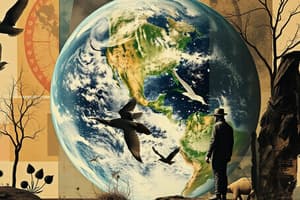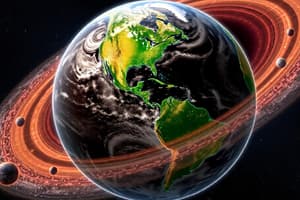Podcast
Questions and Answers
The atmosphere is composed of ______ % nitrogen.
The atmosphere is composed of ______ % nitrogen.
78
The process of water vapor changing to liquid water is called ______.
The process of water vapor changing to liquid water is called ______.
condensation
One of the gases in the atmosphere is ______, which makes up 21% of the composition.
One of the gases in the atmosphere is ______, which makes up 21% of the composition.
oxygen
The ______ cycle involves the transformation and movement of water through various processes.
The ______ cycle involves the transformation and movement of water through various processes.
Sublimation is the process where ______ changes directly to water vapor.
Sublimation is the process where ______ changes directly to water vapor.
Gas giant planets are known for their large ______ and thick atmospheres.
Gas giant planets are known for their large ______ and thick atmospheres.
Groundwater is water that has been ______ into the ground from precipitation.
Groundwater is water that has been ______ into the ground from precipitation.
Earth's unique feature includes its diverse ______ that supports various life forms.
Earth's unique feature includes its diverse ______ that supports various life forms.
The rock cycle is responsible for the ______, sculpting, and transformation of rocks.
The rock cycle is responsible for the ______, sculpting, and transformation of rocks.
During ______, plants release water vapor into the atmosphere.
During ______, plants release water vapor into the atmosphere.
Flashcards are hidden until you start studying
Study Notes
Characteristics of Uranus and Neptune
- Composed of icy materials like water, methane, and ammonia above a rocky core.
- Atmospheres primarily consist of molecular hydrogen and atomic helium, with trace amounts of methane.
Earth: A Unique Home
- Known as the "Goldilocks Planet" for its ideal distance from the Sun, maintaining temperatures suitable for liquid water.
- Liquid water is unique to Earth, allowing life to thrive within a temperature range of -15°C to 115°C.
- Atmosphere composed of nitrogen, carbon dioxide, and oxygen, essential for supporting life and providing protection from radiation and meteorites.
- Steady energy sources, including light and chemical energy, are crucial for sustaining life.
Earth's Nutrient Circulation
- Various natural mechanisms, including the water cycle, atmosphere, and volcanic activity, facilitate nutrient circulation essential for ecosystems.
Earth’s Four Subsystems
- Geosphere: Comprised of several distinct layers of land with nutrient-rich soil at the top.
- Hydrosphere: Encompasses all forms of water on Earth; 97% is saline, found mainly in oceans.
- Biosphere: Includes all living organisms, such as microorganisms, plants, and animals.
Cosmic Origins
- Big Bang Theory: The universe originated approximately 13.8 billion years ago from a singular point, leading to continuous expansion.
- Nebular Hypothesis: The solar system formed around 4.54 billion years ago from a cold solar nebula, leading to the creation of the Sun and surrounding planets through gravitational forces.
Overview of Solar System Planets
- Mercury: A rocky planet with a cratered surface and thin atmosphere, mainly composed of oxygen and other gases.
- Venus: Features a solid surface with volcanic plains and extreme temperatures that can melt lead.
- Earth: A dynamic rocky planet with diverse terrain and significant water coverage, providing a balanced atmosphere for life.
- Mars: Altered by geological activities with a thin atmosphere containing small amounts of oxygen and water vapor.
- Jupiter: The largest planet, composed mainly of gas with a hydrogen and helium-rich atmosphere.
- Saturn: A gas giant lacking a solid surface, possibly with an undiscovered solid core.
Earth's Atmospheric Composition
- Nitrogen: 78%
- Oxygen: 21%
- Argon: 0.9%
- Minor amounts of carbon dioxide, nitrous oxides, methane, and ozone.
Water Cycle Processes
- Evaporation: Surface water turns into vapor, energized by the sun.
- Sublimation: Ice transforms directly into vapor due to temperature increase.
- Transpiration: Plants release water vapor through leaf stomata.
- Condensation: Water vapor cools and forms liquid droplets, resulting in cloud formation.
- Precipitation: Water droplets in clouds fall as rain; some water contributes to surface runoff or groundwater.
Rock Cycle
- A dynamic process responsible for the degradation, sculpting, and transformation of rocks in Earth's crust.
Studying That Suits You
Use AI to generate personalized quizzes and flashcards to suit your learning preferences.




